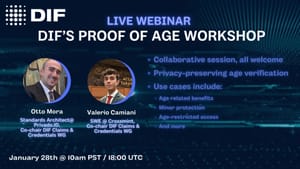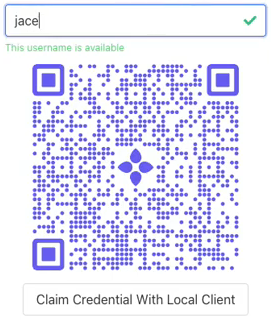By Kim Hamilton Duffy, on behalf of the Decentralized Identity Foundation (DIF) Claims & Credentials Working Group
The Claims & Credentials Working Group at DIF is excited to announce the release of the Presentation Exchange (PE) v2 specification. This updated and ratified version of the spec includes a restructured set of core requirements, as well as an extensibility mechanism through the use of “features.”
But first, let’s take a step back: The DIF Claims & Credentials Working Group is responsible for developing interoperable formats and supporting tools for broad adoption around issuing, requesting, exchanging and verifying credentials in a vendor-agnostic manner. Current work items include Schema Registries, Trust Establishment, Data Agreement, JWT-VC Interop Profiles, and of course, Presentation Echange. All of this open-source work is licensable under Apache 2.0, Creative Commons Attribution 4.0 or W3C Patent licensing, as outlined in the WG Charter here, and WG Operating Addendum here.
So, what is Presentation Exchange all about? In short, it enables a verifier to express to a credential holder (via their software agent, such as a wallet) their requirements for claims and proofs. For example, a financial institution can use PE to express to a potential customer (via the customer’s credential wallet) that they require a driver’s license from a certain set of state DMVs, as well as proof of address. The customer’s wallet can then use this information to pre-select the necessary credentials and, upon receiving the customer’s consent, generate a cryptographic signature, and package it all up to send to the financial institution. Importantly, different kinds of wallets using different cryptography and credentials formats can be added and subtracted over time, abstracting out many of the divergences in today’s verifiable credential systems.
With the release of PE v2, we have restructured the spec to define a reduced set of core requirements for implementers. This was based on input from implementers across different identity standards communities, who were all converging around a core set of baseline requirements on their respective roads to production. The spec separates this core set from additional functionalities, known as “features” which enable additional features only activated when both wallet and server signal support for them. This design allows verifiers and relying parties to layer additional functionality on top of the PE spec, while still providing a streamlined, implementable baseline for all implementers and a graceful upgrade path for wallets and implementations alike.
Additionally, we have restructured some of the PEv1 data model, moving previously mandatory properties and objects into optional features, which enables a more concise and consumer-friendly language. A variety of other minor improvements were also made based on implementer feedback. You can find more details on these updates in a new section of the spec, available here.
The net result of these various updates is a broader range of support for the PE spec. A number of companies and organizations have already implemented the spec, including Block, Bloom, Centre, Circle, OIDF, Sphereon, Spruce, Workday, Benri, and Gen Digital just to name a few.
Presentation Exchange: in short, it enables a verifier to express to a credential holder (via their software agent, such as a wallet) their requirements for claims and proofs.
Presentation Exchange V2 joins the list of delivered work items from DIF WGs, including SideTree and DIDComm v2. If you’re interested in getting involved and joining DIF, we encourage you to visit the DIF website to learn more about what we do. We look forward to working with you to advance the field of decentralized identity.




